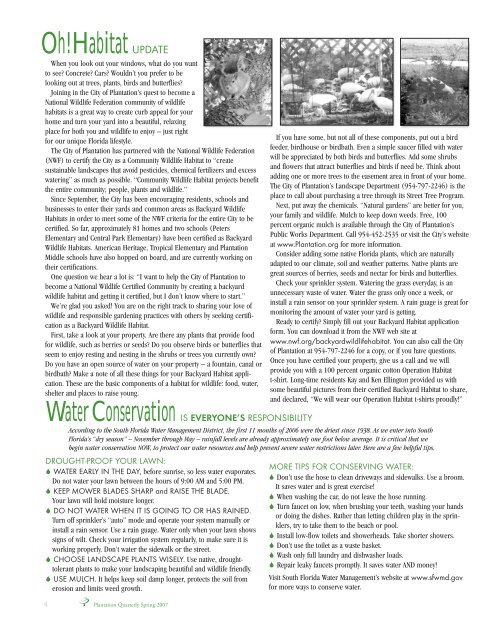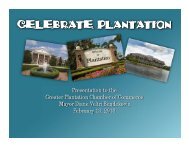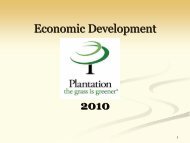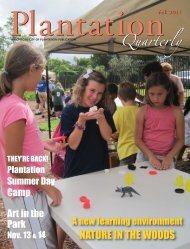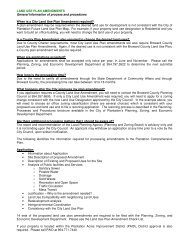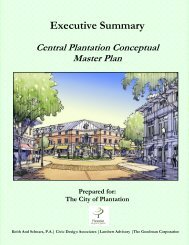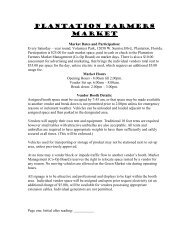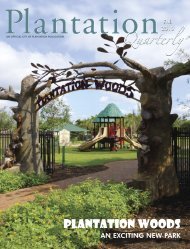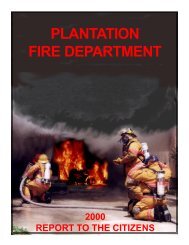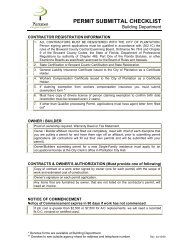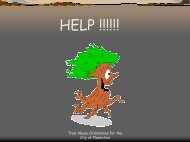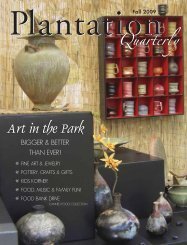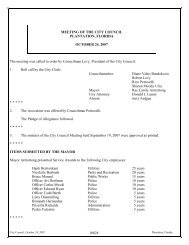Spring 2007 - City of Plantation
Spring 2007 - City of Plantation
Spring 2007 - City of Plantation
Create successful ePaper yourself
Turn your PDF publications into a flip-book with our unique Google optimized e-Paper software.
Oh!Habitat UPDATE<br />
When you look out your windows, what do you want<br />
to see? Concrete? Cars? Wouldn’t you prefer to be<br />
looking out at trees, plants, birds and butterflies?<br />
Joining in the <strong>City</strong> <strong>of</strong> <strong>Plantation</strong>’s quest to become a<br />
National Wildlife Federation community <strong>of</strong> wildlife<br />
habitats is a great way to create curb appeal for your<br />
home and turn your yard into a beautiful, relaxing<br />
place for both you and wildlife to enjoy – just right<br />
for our unique Florida lifestyle.<br />
The <strong>City</strong> <strong>of</strong> <strong>Plantation</strong> has partnered with the National Wildlife Federation<br />
(NWF) to certify the <strong>City</strong> as a Community Wildlife Habitat to “create<br />
sustainable landscapes that avoid pesticides, chemical fertilizers and excess<br />
watering” as much as possible. “Community Wildlife Habitat projects benefit<br />
the entire community; people, plants and wildlife.”<br />
Since September, the <strong>City</strong> has been encouraging residents, schools and<br />
businesses to enter their yards and common areas as Backyard Wildlife<br />
Habitats in order to meet some <strong>of</strong> the NWF criteria for the entire <strong>City</strong> to be<br />
certified. So far, approximately 81 homes and two schools (Peters<br />
Elementary and Central Park Elementary) have been certified as Backyard<br />
Wildlife Habitats. American Heritage, Tropical Elementary and <strong>Plantation</strong><br />
Middle schools have also hopped on board, and are currently working on<br />
their certifications.<br />
One question we hear a lot is: “I want to help the <strong>City</strong> <strong>of</strong> <strong>Plantation</strong> to<br />
become a National Wildlife Certified Community by creating a backyard<br />
wildlife habitat and getting it certified, but I don’t know where to start.”<br />
We’re glad you asked! You are on the right track to sharing your love <strong>of</strong><br />
wildlife and responsible gardening practices with others by seeking certification<br />
as a Backyard Wildlife Habitat.<br />
First, take a look at your property. Are there any plants that provide food<br />
for wildlife, such as berries or seeds? Do you observe birds or butterflies that<br />
seem to enjoy resting and nesting in the shrubs or trees you currently own?<br />
Do you have an open source <strong>of</strong> water on your property – a fountain, canal or<br />
birdbath? Make a note <strong>of</strong> all these things for your Backyard Habitat application.<br />
These are the basic components <strong>of</strong> a habitat for wildlife: food, water,<br />
shelter and places to raise young.<br />
4 <strong>Plantation</strong> Quarterly <strong>Spring</strong> <strong>2007</strong><br />
If you have some, but not all <strong>of</strong> these components, put out a bird<br />
feeder, birdhouse or birdbath. Even a simple saucer filled with water<br />
will be appreciated by both birds and butterflies. Add some shrubs<br />
and flowers that attract butterflies and birds if need be. Think about<br />
adding one or more trees to the easement area in front <strong>of</strong> your home.<br />
The <strong>City</strong> <strong>of</strong> <strong>Plantation</strong>’s Landscape Department (954-797-2246) is the<br />
place to call about purchasing a tree through its Street Tree Program.<br />
Next, put away the chemicals. “Natural gardens” are better for you,<br />
your family and wildlife. Mulch to keep down weeds. Free, 100<br />
percent organic mulch is available through the <strong>City</strong> <strong>of</strong> <strong>Plantation</strong>’s<br />
Public Works Department. Call 954-452-2535 or visit the <strong>City</strong>’s website<br />
at www.<strong>Plantation</strong>.org for more information.<br />
Consider adding some native Florida plants, which are naturally<br />
adapted to our climate, soil and weather patterns. Native plants are<br />
great sources <strong>of</strong> berries, seeds and nectar for birds and butterflies.<br />
Check your sprinkler system. Watering the grass everyday, is an<br />
unnecessary waste <strong>of</strong> water. Water the grass only once a week, or<br />
install a rain sensor on your sprinkler system. A rain guage is great for<br />
monitoring the amount <strong>of</strong> water your yard is getting.<br />
Ready to certify? Simply fill out your Backyard Habitat application<br />
form. You can download it from the NWF web site at<br />
www.nwf.org/backyardwildlifehabitat. You can also call the <strong>City</strong><br />
<strong>of</strong> <strong>Plantation</strong> at 954-797-2246 for a copy, or if you have questions.<br />
Once you have certified your property, give us a call and we will<br />
provide you with a 100 percent organic cotton Operation Habitat<br />
t-shirt. Long-time residents Kay and Ken Ellington provided us with<br />
some beautiful pictures from their certified Backyard Habitat to share,<br />
and declared, “We will wear our Operation Habitat t-shirts proudly!”<br />
WaterConservation IS EVERYONE’S RESPONSIBILITY<br />
According to the South Florida Water Management District, the first 11 months <strong>of</strong> 2006 were the driest since 1938. As we enter into South<br />
Florida’s “dry season” – November through May – rainfall levels are already approximately one foot below average. It is critical that we<br />
begin water conservation NOW, to protect our water resources and help prevent severe water restrictions later. Here are a few helpful tips.<br />
DROUGHT-PROOF YOUR LAWN:<br />
WATER EARLY IN THE DAY, before sunrise, so less water evaporates.<br />
Do not water your lawn between the hours <strong>of</strong> 9:00 AM and 5:00 PM.<br />
KEEP MOWER BLADES SHARP and RAISE THE BLADE.<br />
Your lawn will hold moisture longer.<br />
DO NOT WATER WHEN IT IS GOING TO OR HAS RAINED.<br />
Turn <strong>of</strong>f sprinkler’s “auto” mode and operate your system manually or<br />
install a rain sensor. Use a rain guage. Water only when your lawn shows<br />
signs <strong>of</strong> wilt. Check your irrigation system regularly, to make sure it is<br />
working properly. Don’t water the sidewalk or the street.<br />
CHOOSE LANDSCAPE PLANTS WISELY. Use native, droughttolerant<br />
plants to make your landscaping beautiful and wildlife friendly.<br />
USE MULCH. It helps keep soil damp longer, protects the soil from<br />
erosion and limits weed growth.<br />
MORE TIPS FOR CONSERVING WATER:<br />
Don’t use the hose to clean driveways and sidewalks. Use a broom.<br />
It saves water and is great exercise!<br />
When washing the car, do not leave the hose running.<br />
Turn faucet on low, when brushing your teeth, washing your hands<br />
or doing the dishes. Rather than letting children play in the sprinklers,<br />
try to take them to the beach or pool.<br />
Install low-flow toilets and showerheads. Take shorter showers.<br />
Don’t use the toilet as a waste basket.<br />
Wash only full laundry and dishwasher loads.<br />
Repair leaky faucets promptly. It saves water AND money!<br />
Visit South Florida Water Management’s website at www.sfwmd.gov<br />
for more ways to conserve water.


